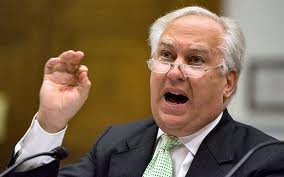Vacation’s over — I was in Colombia (Cartagena and Bogota), more about which in another post — and I’ve spent much of today trying to catch up on what happened while I was gone.
 The biggest development in what I’ve read so far is the death of the Brodsky bill to curtail museum deaccessioning in the New York legislature. That’s good news. Assemblyman Richard Brodsky (at right) says his bill is the only thing blocking the “beancounters,” who’ll sell museum collections at the drop of a hat to pay the HVAC bills, from raiding our museums. But it was a bad bill as written last winter, when it would have created an unfunded mandate for too many institutions (who’d have had to catalogue everything they own), among other flaws, and it’s still a bad bill with his proffered modifications.
The biggest development in what I’ve read so far is the death of the Brodsky bill to curtail museum deaccessioning in the New York legislature. That’s good news. Assemblyman Richard Brodsky (at right) says his bill is the only thing blocking the “beancounters,” who’ll sell museum collections at the drop of a hat to pay the HVAC bills, from raiding our museums. But it was a bad bill as written last winter, when it would have created an unfunded mandate for too many institutions (who’d have had to catalogue everything they own), among other flaws, and it’s still a bad bill with his proffered modifications.
Brodsky seems to have blamed opposition by some big insitutions, like the Metropolitan Museum of Art, for the bill’s demise, but my reporting says otherwise. Several legislators, and their staffs, were unconvinced of the bill’s overall wisdom.
As I’ve written, I believe deaccessioning for purposes other than art acquisitions should be rare, but possible in dire circumstances — only after an arbitration process proving that all other remedies had been exhausted.
Brodsky and his supporters have been using scare tactics. For example, what Michael Botwinick told The New York Times in last Wednesday’s article about the bill’s demise is ludicrous: financially troubled institutions now believe “the Rembrandts in the collection are no different than the IBM stock.”
For his part, Brodsky ended the article saying: “If we don’t act here, the bean counters will triumph, and we’ll see huge amounts of public art privatized.”
Evidence please?
Yet at the same time, Brodsky approves of a measure that would allow museums to raid their endowments without — as is currently necessary — seeking approval from the state Attorney General’s office. On that score, he trusts the beancounters — despite the fact that most museum endowments are too skimpy now. And without decent endowments, they generally can not balance their budgets without hefty efforts at fund-raising year in, year out.
At least that’s what Brodsky thought in June.
Now he is running for attorney general. We’ll see how he feels about giving up power if he gets the nod.
This battle, which is really about the control of museum governance, is not over yet. Brodsky still wants to be in the driver’s seat; just watch for a change in tactics.
